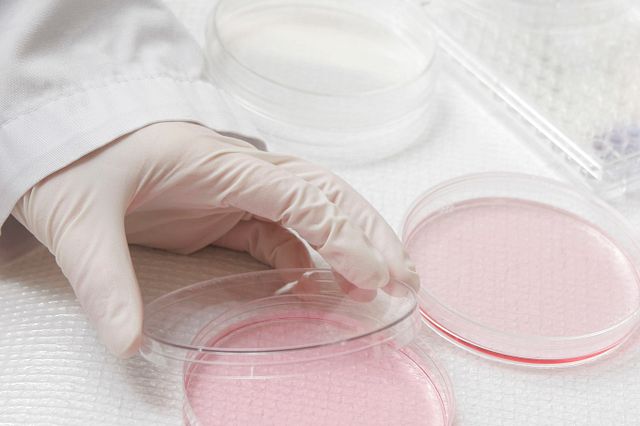ISO 11137 Sterilization Validation Testing for Medical Products
The ISO 11137 series of standards is a cornerstone in the field of medical device biocompatibility and sterilization. This service focuses specifically on the validation of sterilization processes used in the production of medical products, ensuring that the final product remains sterile throughout its shelf life while maintaining its intended functionality and safety for patients.
The process of sterilization involves subjecting a medical device to conditions that eliminate or sufficiently reduce microbial life to prevent subsequent infections when the device is used under normal conditions. The ISO 11137 series provides detailed protocols on how to validate such processes, ensuring compliance with regulatory standards and quality assurance requirements.
In the context of additive manufacturing (AM) in medical applications, this service ensures that the materials used in 3D printing are not only biocompatible but also capable of being sterilized without compromising their structural integrity or chemical properties. This is particularly important for implants, surgical instruments, and other devices where sterility is critical to prevent post-surgical infections.
The testing process typically involves several key steps: selection of the appropriate sterilization method (e.g., autoclaving, ethylene oxide), preparation of test specimens using AM techniques, exposure of these specimens to the sterilization process, and subsequent microbiological testing to confirm sterility. The acceptance criteria for this service are stringent, ensuring that no viable microorganisms remain on or within the device.
The results of ISO 11137 testing are critical for regulatory approval and market entry. They provide assurance to healthcare providers and patients that a medical product is safe and effective when used as intended. For manufacturers, these tests help in optimizing sterilization processes, reducing the risk of recalls or legal issues.
Understanding the nuances of ISO 11137 testing requires an intimate knowledge of both additive manufacturing processes and biocompatibility standards. Our laboratory employs experts who are well-versed in these areas, ensuring that each test is conducted with precision and accuracy.
The importance of this service cannot be overstated, especially given the increasing demand for personalized medical devices. As 3D printing technology continues to evolve, so too must the testing methodologies used to validate sterilization processes. Our team stays at the forefront of these developments, ensuring that we provide the most accurate and up-to-date services.
Why It Matters
The importance of ISO 11137 sterilization validation testing for medical products cannot be understated. Compliance with these standards is not just a regulatory requirement but also a matter of patient safety and trust in the healthcare industry.
Patients rely on medical devices to be safe, effective, and sterile. Any failure in the sterilization process can lead to infections or other adverse health outcomes. This testing ensures that the devices meet stringent biocompatibility standards before they reach the market. It also helps manufacturers identify potential issues early in the production process, allowing for corrective actions to be taken.
For quality managers and compliance officers, this service provides a robust framework for ensuring product safety and regulatory compliance. It allows them to demonstrate due diligence in their efforts to provide safe medical products. R&D engineers benefit from this testing as it helps refine sterilization processes, leading to more efficient production methods. For procurement departments, this ensures that the raw materials used are suitable for sterilization without compromising quality.
The implications of not adhering to these standards can be severe. Regulatory bodies may impose fines or withdraw product approvals if non-compliance is discovered. Patient trust in medical devices could erode, leading to decreased market share and reputational damage for manufacturers. Thus, ISO 11137 testing is an investment in long-term success and patient safety.
Applied Standards
| Standard | Description |
|---|---|
| ISO 11137-1:2016 | Biological indicators for sterilization of health-care products — Part 1: Selection, use and validation. |
| ISO 11137-2:2019 | Biological indicators for sterilization of health-care products — Part 2: Sterility test methods. |
| ISO 11137-3:2018 | Biological indicators for sterilization of health-care products — Part 3: Monitoring and documentation. |
The ISO 11137 series is widely recognized as the gold standard in sterilization validation testing for medical devices. These standards provide a comprehensive approach to ensuring that medical products are safe, effective, and sterile throughout their shelf life.
ISO 11137-1 focuses on the selection of biological indicators, which are used to monitor the effectiveness of sterilization processes. ISO 11137-2 details the methods for performing sterility tests to confirm that no viable microorganisms remain after sterilization. Finally, ISO 11137-3 provides guidelines for monitoring and documenting the entire process, ensuring compliance with regulatory requirements.
By adhering to these standards, our laboratory ensures that each test is conducted in a manner consistent with international best practices. This not only enhances the reliability of our results but also helps manufacturers meet the expectations of regulatory bodies worldwide.
Why Choose This Test
Choosing ISO 11137 sterilization validation testing for medical products is a strategic decision that can have far-reaching benefits. Here are some reasons why this service stands out:
Regulatory Compliance: Adherence to international standards ensures compliance with regulatory requirements, facilitating market entry and reducing the risk of legal challenges.
Patient Safety: By confirming that medical devices remain sterile throughout their shelf life, we help protect patients from potentially harmful infections or other adverse effects.
Quality Assurance: This testing helps manufacturers identify and rectify any issues in sterilization processes early on, leading to more efficient production methods and higher quality products.
Reputation Management: A reputation for producing safe, high-quality medical devices can significantly enhance a manufacturer's market position. ISO 11137 testing supports this by providing assurance of product safety and efficacy.
Cost Efficiency: While the initial cost of this service may seem high, it pales in comparison to the potential costs associated with recalls, legal disputes, or reputational damage caused by non-compliance.
Our laboratory offers a comprehensive package that goes beyond basic testing. We provide detailed reports and recommendations for optimizing sterilization processes, ensuring that manufacturers can achieve the best possible outcomes.





